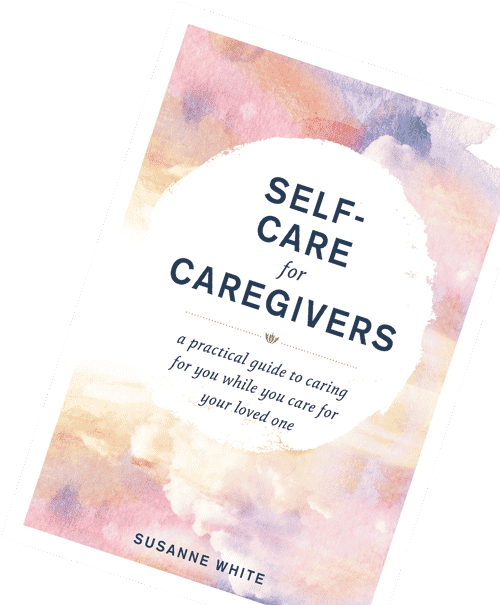NOW AVAILABLE!
Self-Care for Caregivers


Everyone I cared for triggered me emotionally. Sometimes I would feel insulted, sometimes I would feel ashamed, and sometimes my feelings would be so hurt I would burst into tears. It came with the territory for me because I cared for my parents, had a historically rocky relationship with my Mom and then I later cared for a family member who was an active addict.
Not everyone will have the histrionics or the dysfunction of addiction to deal with but most relationships have normal little bumps in the road. Sickness, worry and pain can cause even the most gentle of patients to be grumpy at the very least. When you add in exhaustion and burnout of the caregiver, we can have a messy emotional mix that feels awful.
So being triggered emotionally is bound to happen. My least favorite trigger is the shame and blame tactic, where I get blamed and then shamed for something I had nothing to do with. Having our buttons pushed and then feeling a wide range of emotions from guilt to anger is not unusual but can feel pretty uncomfortable.
I’d like to share a few tricks I use after being emotionally triggered. I can’t stop being triggered or having my buttons pushed but I can respond rather than react and be easier on myself and everyone else.
Be aware and observe
This can be extremely hard to do but with practice, it gets easier and happens faster. Get in touch with how you are feeling. If all of a sudden someone says something or does something that upsets you in any way, be aware. Make note. Check out what your mind and body are doing. Is your heart racing, is your stomach in knots, are you blushing? Rather than wanting to strangle someone, step back and observe what’s going on for you. It almost as though you are watching what is happening from a distance and something very interesting is going on. Awareness and observation can actually diffuse the power of your immediate reaction. This can give your brain the job of watching you and what’s going on, help to softened the blow, and distract you from an immediate reaction.
Help yourself out
Focus on your breathing. Take some deep breaths. Think of something that makes you relax. Take a break. Leave the room or the situation. For instance, I’ve said: “Oh I’ll be right back”, and then left with no further explanation. I’ve even left a meeting that way and never went back! And the sky didn’t fall in. I would never suggest walking away from a situation that would leave someone we care for in danger, but in general, if we can take a time out and regroup we will always feel better, faster. Anything we can do to give pause to our reaction will help us.
Understand it’s probably not you
Understanding that when in fact our loved one is nasty or angry with us they are just angry at the world. Taking on the blame for someone who is acting out (when it has nothing to do with us) is a trap we can get into because of old relationships or behavioral patterns. Don’t take the blame. Examine the underlying reason they are being so difficult. Are they in pain, are they anxious or afraid, and have they always acted like this when they were unhappy or uncomfotable in general. Although ths isn’t pleasent or healthy, it may just be the way they cope. It still has nothing to do with you and you are not the problem. If they are in pain, or scared, fixing the problem should create a safer, calmer space automatically.
Treat yourself with love and respect
Instead of walking away from being triggered saying or thinking you should have said or done this or that, recognize your ability to be civil and courteous. Give yourself credit for surviving what might feel like an attack or emotional tsunami that came out of nowhere. Honor your attempts to understand the root of why you react to certain behaviors and how you are beginning to cope with being triggered. This is a process and you will get better at it.
Accepting your discomfort as warranted and understandable opens the door to being compassionate with yourself and sets you up to stop taking it all so personally. Everyone has triggers. You are not alone. You will get better at managing your reactions and coping with button pushers. Good luck!
Let me know if you have any secret sauce or coping tactics you use when you get emotionally triggered! As always your feedback means the world to me!
If you liked this blog, you’ll love this one!
Dear Caregiver Warriors,
As one Caregiver Warrior to another, I offer advice, helpful tips, and strategies based on the experience, strength, and hope I found while surviving my own caregiving journey. It has become my mission to share my stories and the things I learned about being an empowered caregiver. To help spread the word and offer guidance to other caregivers, I have written a new book entitled “Self Care for Caregivers: a practical guide to caring for you while you care for your loved one.” It’s available at your favorite bookstore. There is even a audio version so you can listen on the go! If you find the book everything you hoped for, please let me know and please leave a review where you purchased the book! Your feedback means the world to me!

Become a Caregiver Warrior to receive my complimentary e-book. Bonus: get inspirational updates, useful information, and exclusive caregiving tips delivered directly to your inbox.
0 Comments